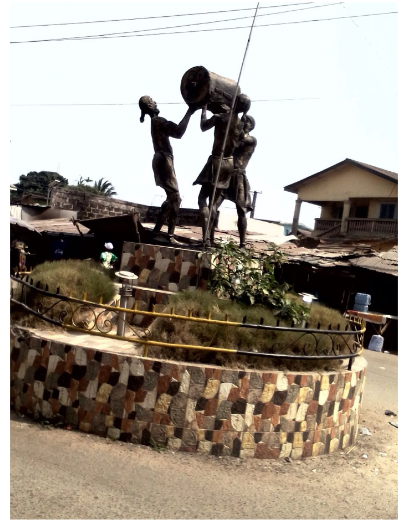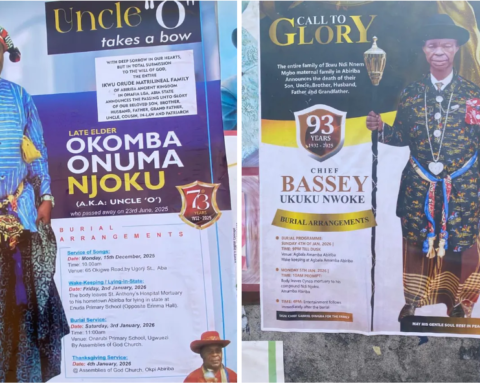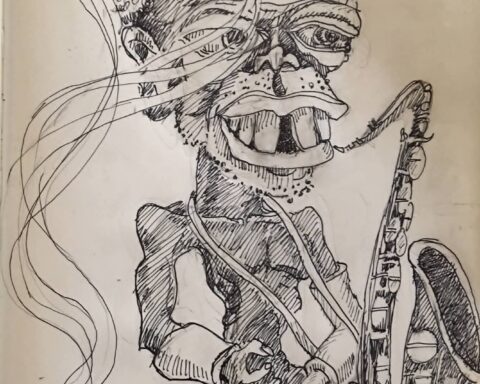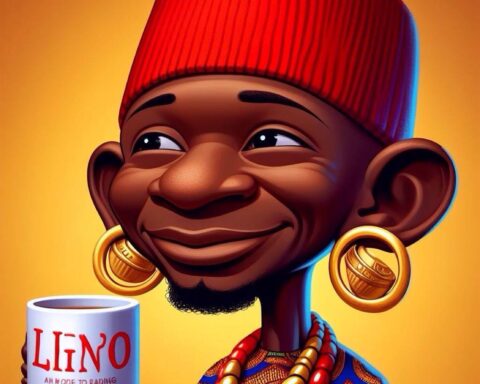By Agbeze Ireke Kalu Onuma, AI-KO
Tradition is not the worship of ashes, but the preservation of fire.” – Gustav Mahler
I stood in my father’s Àmàukwa compound Amaebelu, Abiriba, in April 2025 when I went for both the Easter holidays and my younger Sisters funeral, the red earth packed hard under my feet. Dust motes danced in a shaft of sunlight falling through the cracked wooden door of the old crumbling shrines, next to a near collapsing toilet where I went in to ease myself. It stood silent now, unused for years. Inside, faint traces of chalk drawings lingered on the walls, and the worn stool where probably my grandfather sat to consult the spirits before he started mending broken legs, hands and bones remained. I felt a pang, sharp and sudden.
This space pulsed with their lives, their beliefs, their choices – choices I have not carried forward. My journey looks different. I hold their blood, their resilience, their fierce love for family within me. Yet, the map I follow has been redrawn by time, faith, and the quiet voice of a different Spirit. The question isn’t just about what traditions I’ve left behind, but why, and how I honor the essence of my people while walking this new path.
My parents, and their parents before them, lived close to the land and the old ways. Formal schooling was a distant dream for them. Their wisdom came from seasons planting yam, from proverbs spoken under the great tree, from the intricate rituals marking birth, death, and the harvest. I, however, sat on school benches. I learned letters and numbers that opened doors they never knew existed. My world expanded beyond the village paths, shaped by books and teachers and ideas from far away.
This education is a gift, a tool they sacrificed for. Yet, it sometimes feels like a bridge spanning a deep river. On one side, their rich, experiential knowing. On the other, my structured, analytical understanding. I hold books; they held the wisdom of weather patterns in their bones. I carry both, but they speak different languages inside me. I strive to listen to the deep, ancestral hum beneath the surface of my learned knowledge, remembering Paul’s words: “Knowledge puffs up, but love builds up” (1 Corinthians 8:1). Education must serve humility and connection, not create distance.
The deepest shift is in the ground of my being: faith. My father, his father, my mother’s father – they walked with the spirits of our ancestors. They honored the earth deities, made offerings at the shrine for protection and bounty. Their world was woven with unseen forces, respected and appeased. My mother’s faith, perhaps softer, was still rooted there. For me, the encounter with Christ was like stepping from shadow into blinding, clarifying light.
The message of grace, of a Father’s love so profound He sent His only Son, shattered the old framework. Where they saw many spirits, I found one God, revealed in Jesus. Where they made offerings for favor, I received an unearned gift. “For it is by grace you have been saved, through faith – and this is not from yourselves, it is the gift of God – not by works, so that no one can boast” (Ephesians 2:8–9). This grace reshaped everything. The shrine room gathers dust not from disrespect, but because my altar is now the quiet space where I open Scripture, where I pray to the One who calls me “child.” I honor their deep reverence, but my worship flows to a different Source, the true “Living Water.”
Then there is the shape of family itself. My father, like his father before him, and my maternal grandfather, lived with multiple wives. It was the accepted pattern, the way to build a large lineage, to show status and strength. Compound life was complex, a web of relationships I observed as a child. I saw the dynamics, the tensions sometimes, the shared responsibilities. My own path is singular. I stand committed to one wife.
This choice isn’t a rejection of my father’s manhood, but a response to a different calling. Christ’s teaching pointed me back to the original design: “Haven’t you read… that at the beginning the Creator ‘made them male and female,’ and said, ‘For this reason a man will leave his father and mother and be united to his wife, and the two will become one flesh’? So they are no longer two, but one flesh. Therefore what God has joined together, let no one separate” (Matthew 19:4–6).
This “one flesh” covenant resonates deeply. It speaks of a profound unity, a deep partnership, a love mirroring Christ’s devotion to His Church (Ephesians 5:25). My father sought strength in numbers; I seek depth in unity. It’s a different kind of strength, built on mutual respect, shared faith, and focused devotion. I carry his desire for a strong family legacy, but I build it on a different foundation, brick by brick with one woman.
Yet, this large family – my many fathers, maternal uncles, countless cousins sprawling from both sides of my lineage – remains a powerful force in my life. We consciously strive to stay connected, bound by the shared blood and the enduring spirit that animated our forebears: resilience, communal responsibility, deep respect. Tradition, viewed through the lens of time and change, can be a complex tapestry, sometimes showing tangled or conflicting threads. I navigate it not with blind adherence, but with eyes wide open, guided by the bedrock of my Christian ethics and spiritual convictions. This is how we choose to keep together – myself and my brothers, regardless of which mother bore us. All my father’s wives, irrespective of age or circumstance, are simply “Mum” to me. No titles denoting seniority or lesser status. No lingering resentments allowed space. No differential treatment based on old hierarchies.
We consciously choose not to perpetuate the painful stories, the divisions, or the “ugly sides” that sometimes shadowed such arrangements. Instead, we actively nurture new traditions. Traditions born from informed choice, not unchallenged custom. Traditions built on mutual respect, open communication, and the shared recognition of our inherent worth as individuals loved by God. Then there’s the broader culture – the vibrant dressing, the elaborate ceremonies marking life’s milestones, the rhythmic dances, the shared feasts. I participate in these. I value them. They are threads in the rich fabric of my history, expressions of my people’s unique personality, their environment, their evolving understanding of the world across generations. But I engage with clear eyes. The blind attachment, the aspects tied to rituals I cannot reconcile with my faith – like certain sacrifices once deemed essential – I lay aside.
I see these cultural expressions as vessels. I seek to understand the essential human longings they originally sought to fulfill: community, identity, gratitude, the marking of sacred time. I take the powerful visuals, the stirring sounds, the profound symbolism, and I interpret them anew. I infuse them with plausible, life-giving meanings anchored in my present faith and values. In doing this, I preserve them. Not as dusty relics, but as living, resonant gifts I can hand down to the next generation. My heritage is indeed a collection of bits and pieces, fragments from a past both glorious and flawed.
My sacred task is not to discard it, nor to enshrine it unchanged. It is to gather these fragments with discernment and love. To weave them together into a coherent whole. A whole that honestly acknowledges the past. A whole that breathes with meaning in the present. A whole that faithfully reflects my relationship with Christ and aligns with the worldview He has shaped within me. It is an act of stewardship, of creative fidelity.
So, what remains? What fire do I preserve from their ashes? Their fierce work ethic – that I carry. The deep respect for elders, the understanding that community is essential – “Be your brother’s keeper” – that lives in me. The importance of hospitality, of sharing food and shelter, that echoes the early church (Hebrews 13:2). Their resilience in the face of hardship, that Stoic endurance Epictetus spoke of, accepting what cannot be changed.
These are not bound by old rituals; they are the enduring spirit of my people, now fueled by the Spirit of Christ. I honor them by living with integrity, by caring for my family deeply, by contributing to my community, by stewarding the earth they revered as God’s creation. My traditions look different. Sunday worship instead of shrine offerings.
Family devotions instead of moonlight folktales (though those stories still hold value!). Monogamous commitment instead of a sprawling compound. But the heart – the desire for blessing, protection, provision, and a strong lineage – that heartbeat continues. I am a branch grafted onto a new Vine (John 15:5), drawing life from Christ, yet nourished by the deep roots reaching into the red earth of my ancestors. My path diverges, but the river of their strength flows within me, redirected by grace, towards a broader sea.
On Tradition and Change:
“A tree cannot stand without its roots, nor a people without their core values.” (Reflecting the Igbo wisdom)
“The wisest men follow their own direction.” – Euripides
“See to it that no one takes you captive through hollow and deceptive philosophy, which depends on human tradition and the elemental spiritual forces of this world rather than on Christ.” – Colossians 2:8 (Urging discernment)
“Tradition is living and active, not a museum piece. We receive it, but we must also pass it on, sometimes transformed by our encounter with truth.” – N.T. Wright (A fresh theological voice)
“Respect your tradition by understanding its essence, then choose how its spirit lives in you.” – AI-KO
“The challenge of modernity is to live without illusions and without becoming disillusioned.” – Antonio Gramsci (Navigating change)



























